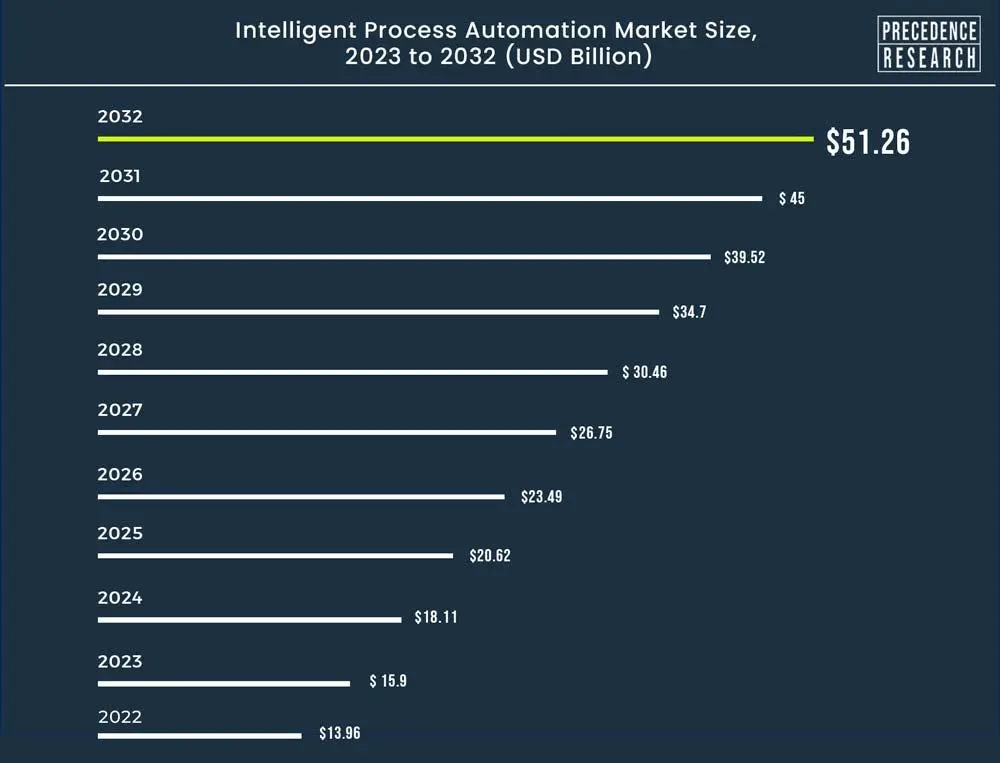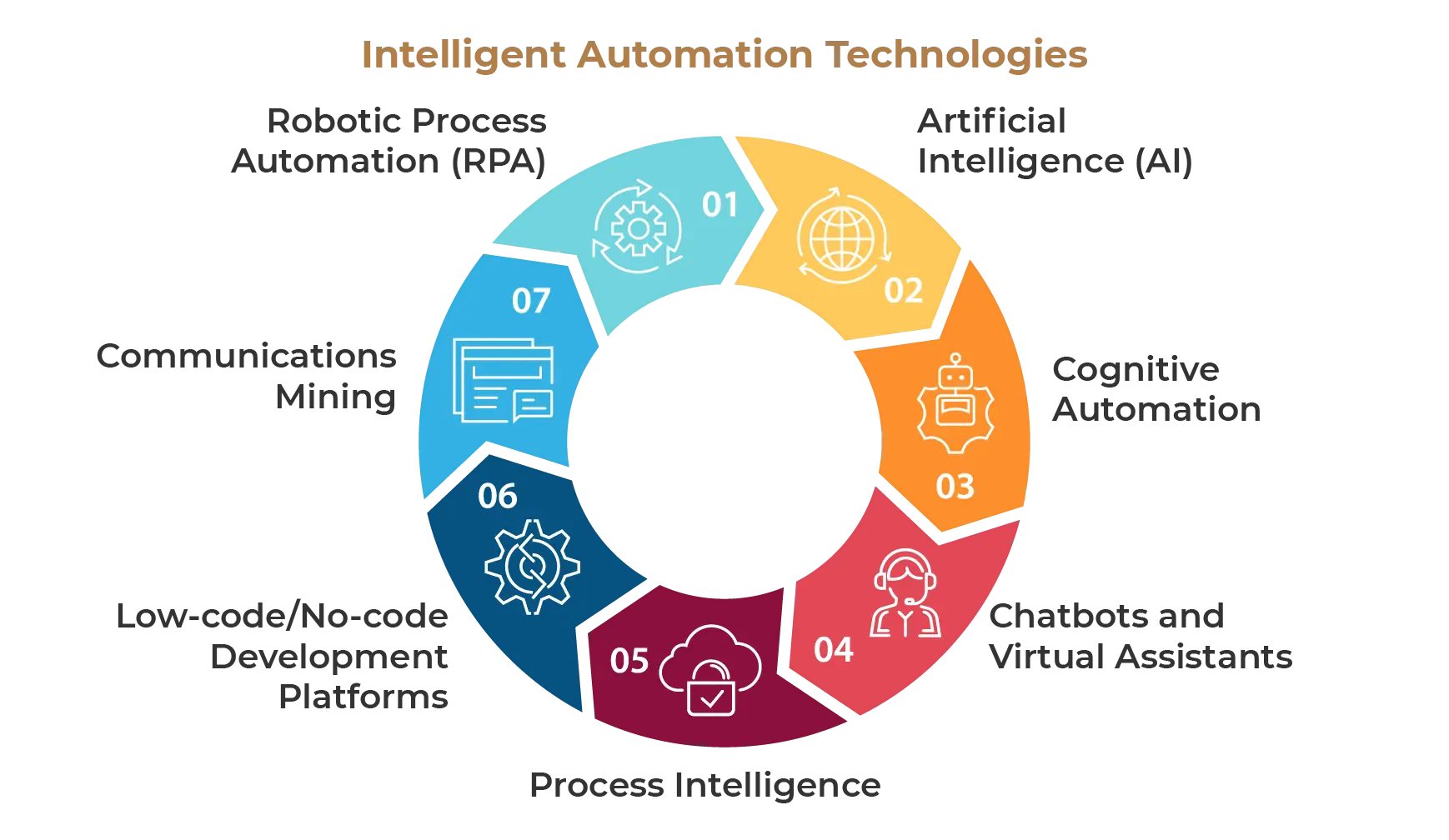With the rising competition in the market, enterprises today no longer want to limit their abilities to traditional automation. In the latest technology trend, organizations are looking for intelligent automation tools to solve business challenges and increase productivity, efficiency, and accuracy that offer multiple benefits to the organization.
CIOs and IT leaders are finding innovative ways to leverage technologies such as intelligent automation, machine learning, and predictive analytics, which are the fastest-growing technologies in the current market. Artificial Intelligence (AI) promises organizations deep insights, analytics, and business solutions like never before.
As per the latest report, the Intelligent Automation market is expanding by around USD 51.26 billion by 2032 with a CAGR of 13.89% from 2023-2032.

What is Intelligent Automation?
Intelligent Automation is using advanced technologies, such as artificial intelligence (AI), business process management, and robotic process automation (RPA), to automate and optimize business processes. It combines the power of AI, machine learning, natural language processing, and automation tools to automate repetitive and rule-based tasks, improve efficiency, and enhance decision-making capabilities.
Intelligent Automation systems are designed to mimic human cognitive abilities to some extent, enabling them to perform tasks that traditionally required human intervention. These systems can analyze and interpret unstructured data, learn from patterns and experiences, make predictions, and execute tasks with minimal human intervention.
Why Intelligent Automation is Important?
Intelligent automation is important to the enterprise as it takes away the repetitive and time consuming tasks, and offers employees time to focus on accelerating patient care. Here are some key reasons why intelligent automation is important-
-
Increased Efficiency and Productivity
By automating repetitive and time-consuming tasks, intelligent process automation tool allow employees to focus on more strategic and value-added activities. With streamlined processes and fewer manual interventions, IPA improves operational efficiency and productivity.
-
Improved Accuracy and Quality
IPA reduces the risk of human errors by ensuring consistent and accurate execution of tasks. It follows predefined rules and standards, minimizing the chances of data entry mistakes or process deviations. This leads to improved data quality and reduced rework.
-
Enhanced Customer Experience
Using intelligent process automation solutions, organizations deliver better customer experiences by automating and optimizing customer-facing processes. It ensures faster response times, reduces wait times, and provides consistent and personalized interactions, leading to increased customer satisfaction and loyalty.
-
Agility and Adaptability
IPA’s cognitive capabilities, such as AI and machine learning, allow systems to adapt to changing circumstances and handle complex tasks. It can learn from data patterns and make intelligent decisions, enabling organizations to quickly respond to market changes, customer demands, and regulatory requirements.
-
Cost Savings
By automating manual and repetitive tasks, IPA reduces labor costs and improves operational efficiency. It minimizes the need for additional workforce and decreases the potential for human-related errors and associated costs. Over time, the cost savings from IPA implementation can be significant.
-
Data Insights and Analytics
IPA leverages AI and machine learning algorithms to analyze large volumes of data. It can extract valuable insights, identify trends, patterns, and anomalies, and provide data-driven recommendations for process optimization and decision-making.
Intelligent Automation Technologies
Intelligent automation encompasses a combination of various technologies that work together to automate and optimize processes while incorporating elements of artificial intelligence. Here are some of the key technologies included in intelligent automation:

-
Robotic Process Automation (RPA)
RPA is the foundation of many intelligent automation solutions. It involves using software robots (bots) to automate repetitive, rule-based tasks typically performed by humans. RPA bots can mimic human actions on computer systems, such as data entry, data extraction, and form filling.
-
Artificial Intelligence (AI)
AI is a crucial component of intelligent automation. It enables machines to perform tasks that typically require human intelligence. AI technologies used in intelligent automation include
- Machine Learning
ML algorithms allow systems to learn from data and improve their performance over time. This is particularly useful for tasks that involve pattern recognition, predictions, and decision-making. - Natural Language Processing (NLP)
NLP enables machines to understand and interpret human language. It is essential for applications like chatbots, virtual assistants, and sentiment analysis. - OCR
OCR technology enables machines to interpret and analyze visual information from images and videos. This is used in applications like image recognition, object detection, and facial recognition.
- Machine Learning
-
Cognitive Automation
Cognitive automation combines AI with RPA to enable more sophisticated automation. It allows systems to learn from unstructured data, make decisions based on context, and adapt to dynamic environments.
-
Chatbots and Virtual Assistants
These are AI-powered conversational interfaces that can interact with users in a natural language. They can handle customer queries, perform actions on request, and provide personalized assistance.
-
Low-code/No-code Development Platforms
These platforms allow business users with limited programming knowledge to build and deploy automation solutions quickly and easily.
-
Process Intelligence
It is a valuable tool extensively utilized in business settings to analyze various processes and generate specific process models of these operations. Essentially, it scrutinizes distinct business workflows, offering insightful information to organizations. By harnessing the power of process intelligence, companies can pinpoint areas of concern within their processes and make substantial enhancements to their operational models.
-
Communications Mining
Communication mining involves the analysis of communication channels such as emails, chat logs, voice recordings, social media interactions, and other forms of electronic communication within an organization or between individuals. It leverages natural language processing (NLP) and machine learning techniques to extract and analyze the content of messages and conversations. This solution can be used in various applications, including customer sentiment analysis, employee feedback evaluation, market research, fraud detection, and compliance monitoring.
Intelligent automation combines these technologies in various ways, depending on the specific use case and requirements, to create efficient, adaptable, and intelligent systems that can significantly improve processes across different industries and domains.
RPA vs IPA- What’s the Difference?
RPA (Robotic Process Automation) and IPA (Intelligent Process Automation) are related but distinct concepts within the realm of automation. Here’s a breakdown of the key differences between RPA and IPA:
-
Scope of Automation
- RPA: RPA focuses on automating repetitive, rule-based tasks that involve structured data. It typically involves software robots or bots that mimic human actions to perform tasks within specific applications or systems.
- IPA: IPA encompasses a broader scope of automation by combining RPA with advanced technologies such as AI, machine learning, and cognitive capabilities. It can handle both structured and unstructured data, automate complex tasks, and enable decision-making based on data insights.
-
Cognitive Capabilities
- RPA: RPA primarily focuses on task automation and process execution. It lacks inherent cognitive capabilities and typically requires explicit instructions or predefined rules to perform tasks.
- IPA: IPA incorporates cognitive technologies like AI, machine learning, natural language processing, and computer vision. These cognitive capabilities enable IPA to understand and process unstructured data, make intelligent decisions, and adapt to changing scenarios without explicit programming.
-
Complexity of Tasks
- RPA: RPA is well-suited for automating relatively simple, repetitive tasks that involve structured data and follow predefined rules.
- IPA: IPA is designed to handle more complex tasks that may involve unstructured data, cognitive processing, and decision-making. It can handle exceptions, adapt to dynamic scenarios, and perform tasks that require cognitive capabilities.
-
Process Optimization
- RPA: RPA focuses on automating specific tasks within a process, often targeting individual process steps to enhance efficiency and reduce errors.
- IPA: IPA takes a broader view of process optimization by combining RPA with advanced technologies. It aims to optimize end-to-end processes, streamline workflows, and leverage data insights to drive continuous improvement.
[Also Read – Top 8 Use Cases to Optimize IT Operations with Intelligent Automation]
How can AutomationEdge help Your Organisation?
AutomationEdge’s Intelligent Automation platform comes with a range of technologies that can help you accelerate process efficiency along with increased employee productivity. Let’s see what all included in the AutomationEdge intelligent platform-
- DocEdge- Intelligent Document Processing
- UI Automation
- Business Process Management
- AI in the Cloud
- Machine Learning
- Communications Mining
To know more about Intelligent Automation solution, do contact us here.
The post Intelligent Automation Technologies to Have the Most Impact on Digital Businesses in 2023 appeared first on AutomationEdge.
This is a companion discussion topic for the original entry at https://automationedge.com/blogs/intelligent-automation-technologies-to-have-most-impact-on-digital-businesses/